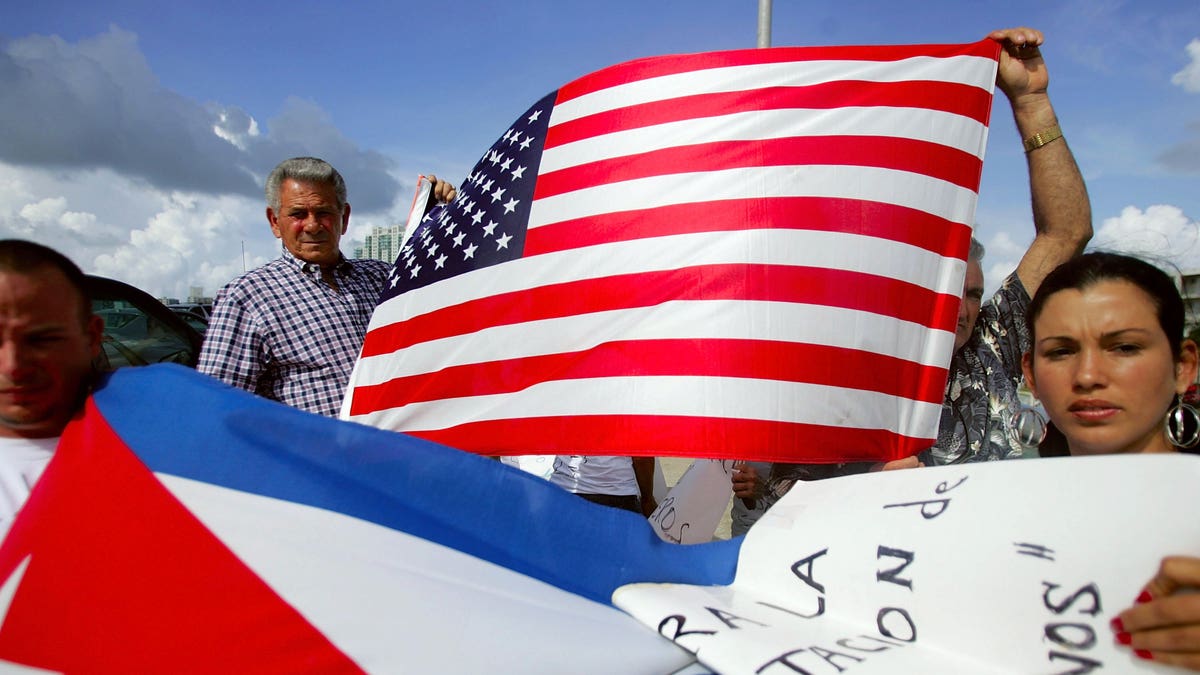
MIAMI - JULY 11: Oridio Conde (L) and Laura Hernandez participate in a protest July 11, 2006 in Miami, Florida. The protest was being held by relatives and friends of the Cubans involved in this past weekend?s interdiction at sea by the U.S. Coast Guard. They want the U.S. government to allow their relatives who are being held on a Coast Guard cutter to be allowed into the United States. One person died and four others were injured when their boat ignored orders to stop by the Coast Guard. (Photo by Joe Raedle/Getty Images) (Getty)
The first time I participated in a Hispanic Heritage event at my local public school, it involved preparing ‘taco salad.’ The dish was my assigned contribution to a class party celebrating Mexico. Having no idea how to create such a concoction, my mother asked for some direction. The teacher sent home a recipe that included cheese, lettuce, kidney beans, Fritos, and French dressing. When completed, it looked disgusting and like nothing any of the Mexicans in my house wanted to eat. ¡Viva Mexico!
The time has come for us to question the value and purpose of Hispanic Heritage Month or at least its educational effectiveness. We as Latinos need to decide what the objectives of Hispanic Heritage month should be beyond consumerism and culinary cultural curriculum.
President Lyndon Johnson, a former teacher at a Mexican American school in the south Texas, started Hispanic Heritage Week in 1968. Twenty years later, President Reagan expanded the celebration to a month-long affair that runs from September 15 to October 15.
For thirty days each year, as stated on hispanicheritagemonth.gov, we celebrate the culture, history, and heritage of ‘citizens’ from ‘Spain, Mexico, the Caribbean, and Central and South America.’ The description makes distinctions, according to both country of origin and citizenship, about who can and should be celebrated, namely citizens, and for how long.
With only 30 days dedicated solely to raising awareness about Hispanics, who is the direct beneficiary of such short-lived annual recognition?
Bookstores move titles by authors with Hispanic surnames to the front of the store. Politicians make trips into Latino communities for photo ops or to try out their phonetic Spanish. Grocery stores encourage shoppers to buy processed frozen taquitos and cheese in a jar to take the fiesta home. We have a mere two weeks to recover from all of the enhanced awareness before it’s on to Native American Heritage Month in November.
The historical focus of Hispanic Heritage celebrations has been on education or cultural initiatives, the idea being that knowledge can be transformative and lead to greater understanding. One can find scores of lesson plans at all grade levels for incorporating Hispanics into the curriculum. People of Mexican origin comprise the majority of all Latinos in the U.S., so it’s no surprise that mariachis and China Poblana dresses abound. Cultural pride and visibility are also important byproducts of the focusing on Hispanics, but too much of either can lead to accusations of being un-American.
Federally backed cultural appreciation can enhance learning but does it have the power to change hearts and minds long term? Black history month didn’t prevent a white police officer from gunning down African American Michael Brown in Ferguson. Native American Heritage month didn’t help Dusten Brown keep Baby Veronica.
The time has come for us to question the value and purpose of Hispanic Heritage Month or at least its educational effectiveness. We as Latinos need to decide what the objectives of Hispanic Heritage month should be beyond consumerism and culinary cultural curriculum. We need a meaningful, sustained integration of Latina/o history and culture into the U.S. education system. We need acknowledge that we consume and are socialized by American culture. We need to account for the diverse populations among and between Latino groups.
Call me a greedy Mexican-American, but I don’t want 30 days. I want the whole year.
